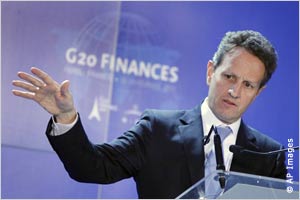
U.S. embassy and consulate websites or www.state.gov.
We’ve gone social!
Follow us on our facebook pages and join the conversation.
22 February 2011
G20 a Step Closer to More Sustainable Economic Growth

Washington — The world’s major economies have taken a step toward better coordination of their economic policies designed to prevent another financial crisis.
Finance ministers and central bankers from the Group of 20 major economic powers, who met in Paris February 18–19, struck a compromise on a set of indicators designed to gauge economic imbalances and warn governments about the risk of those imbalances reaching dangerous levels. Many economists believe that global trade and financial imbalances contributed to the recent financial crisis.
Currency exchange rates, which many policymakers and economists consider essential for measuring the imbalances, were not among the agreed indicators. The final G20 communiqué said exchange rates would be given “due consideration.”
French Finance Minister Christine Lagarde told a news conference that “divergent interests” prevented her and her colleagues from making even more significant progress toward agreement on indicators, specific levels at which they could be considered too risky and the ways to mitigate related risks.
According to news reports, China insisted on excluding exchange rates. At the previous G20 meeting, China, together with Germany and other major exporters, also resisted efforts to set binding targets on the indicators.
U.S. Treasury Secretary Timothy Geithner said in a prepared statement February 19 that China’s currency remains “substantially” undervalued, despite Beijing’s 2010 move to allow it to appreciate against the U.S. dollar at a set pace.
The final communiqué noted divergent growth trajectories among the G20 economies after the recent financial crisis, with subdued growth and high unemployment in most developed countries and growth acceleration in major emerging markets. Geithner said some emerging markets try to deal with the related challenges by holding their currencies undervalued and limiting capital inflows. These measures only make their problems worse and “shift the burden of adjustment to others,” he said.
Geithner said, however, the G20 countries are moving “gradually” to build consensus on ways to assess indicators and causes of the imbalances, which have left major exporting countries with trade surpluses and major importing countries with trade deficits. He said this process would take time but expressed optimism that the final goal would be reached because emerging market economies have a strong interest in reducing the risk from the imbalances to their future economic growth and financial stability.
International Monetary Fund (IMF) Managing-Director Dominique Strauss-Kahn was less optimistic about such prospects. With the global economy improving, he told a news conference, countries feel less pressure to find a consensus. “Many believe wrongly the crisis is behind us, and they have domestic concerns,” he said. The IMF is among international bodies designated to play a major role in monitoring the global growth adjustment process.
Lagarde said the agreed indicators would serve as the starting point for drafting of guidelines for coordinated economic policies that in turn could lead to a mutual assessment process.
The final list of indicators includes public debt and fiscal deficit, the measures on which the United States and other developed countries have promised to do better. Geithner said the budget President Obama submitted to Congress earlier in February meets the G20 countries’ commitment to halve their fiscal deficits by 2013 and to stabilize the ratio of public debt to gross domestic product by 2016.
The texts of the final communiqué and Geithner’s remarks are available on the official G20 website and the U.S. Treasury Department website, respectively.
(This is a product of the Bureau of International Information Programs, U.S. Department of State. Web site: http://www.america.gov)
